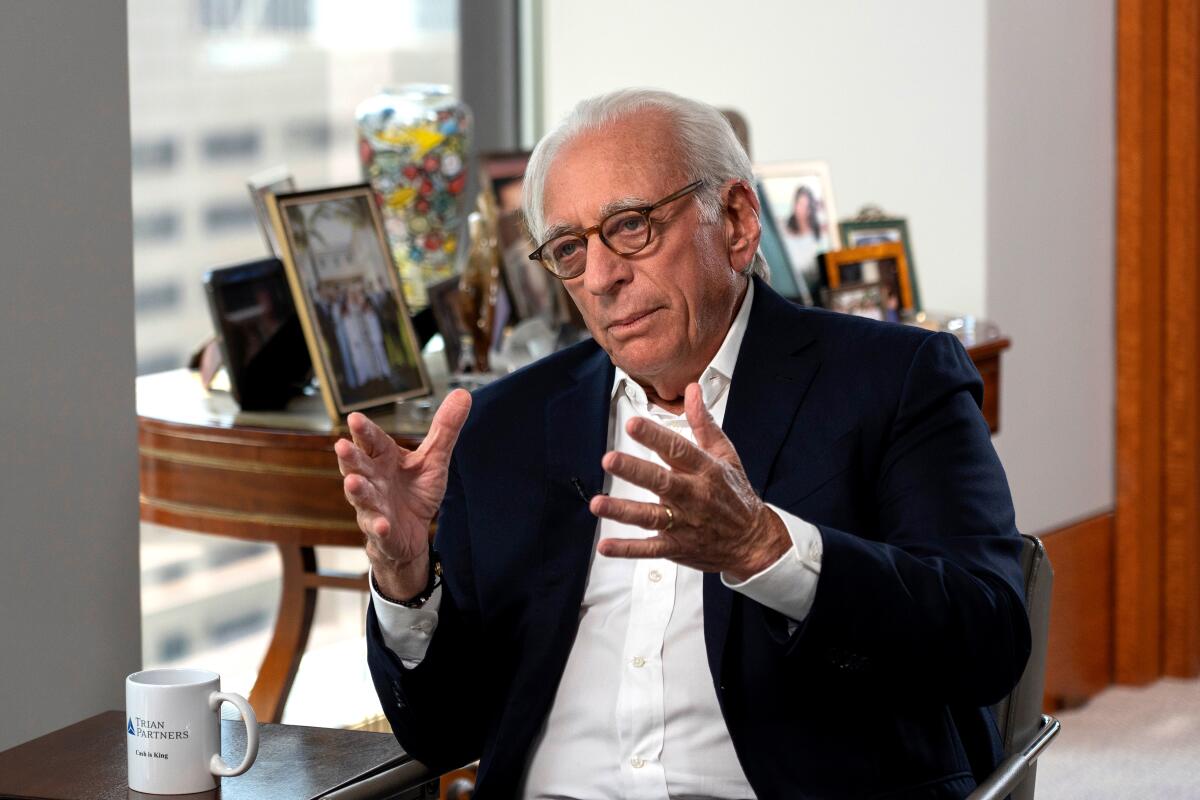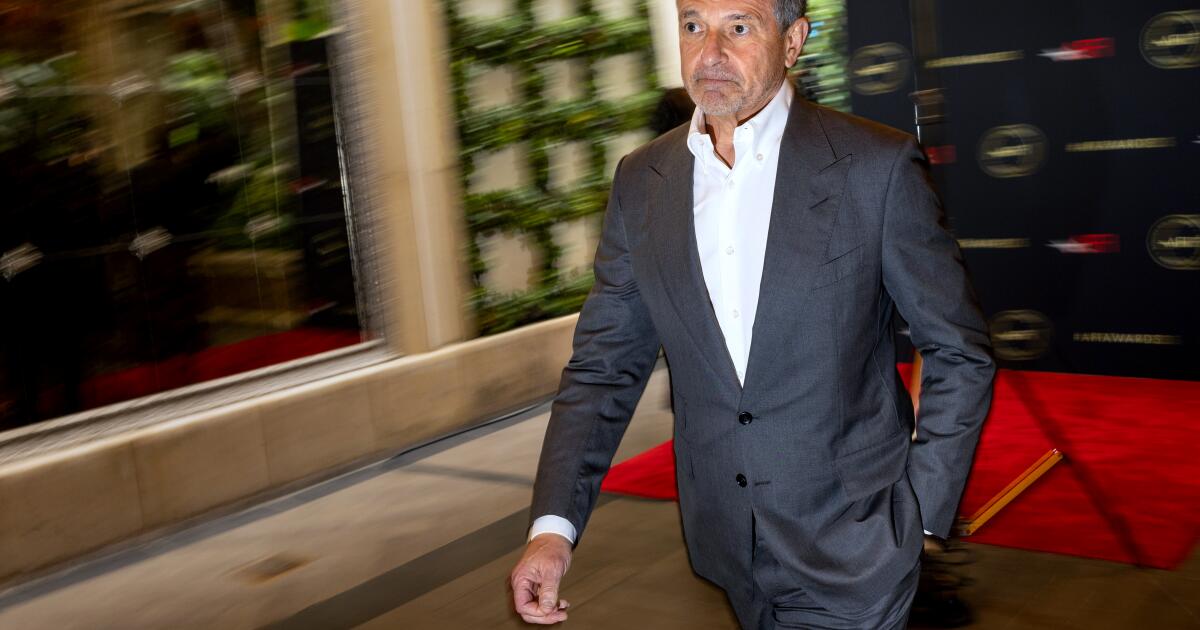Walt Disney Co.’s biggest boardroom showdown in 20 years culminates this week with an election that has already reverberated throughout the Burbank entertainment giant.
Billionaire Nelson Peltz has waged a nearly six-month battle for a seat on Disney’s board of directors. A smaller activist group, Blackwells Capital, joined the fray with three other candidates. Disney has offered its own slate of 12 nominees, including two new board members.
On the surface, the opposition campaigns do not threaten the standing of Disney Chief Executive Bob Iger, whose reelection to the board is uncontested. But Wednesday’s vote has turned into a contentious referendum on the celebrated CEO, who has struggled to tame the enormous problems that prompted his return in late 2022.
If Disney prevails, and its nominees are elected, Iger should have a clear runway to carry out his turnaround plan for the century-old company before his planned retirement in 2½ years. However, the dynamics could be strained should Peltz — the founder and CEO of Trian Fund Management — and his running mate, former Disney executive Jay Rasulo, join the board.
Could history repeat itself? The dissension contains echoes of 2004, when then-CEO Michael Eisner publicly feuded with high-profile members of the Disney family to stay in power. Eisner survived the vote, but not unscathed. He relinquished his chairman role and left the company the following year to make way for Iger.
This year’s campaign has turned bitter and personal: Peltz has accused Disney of engaging in “stupid” behavior. The company’s financial performance has deteriorated, its stock has underperformed and its directors have not looked out for shareholders, Trian said.
“Despite its many advantages, Disney has lost its way,” Trian said in its letter to shareholders.
The rub has been Disney’s subpar stock performance over the last decade, uneven box-office results and a botched succession plan.
Iger handed the reins to his hand-picked successor Bob Chapek in 2020, but he soon stumbled, prompting the board to bring back Iger less than a year after the longtime chief left the board.
“Iger is not the only person on Earth who could run that company successfully,” said Charles Elson, a former director at the Weinberg Center for Corporate Governance at the University of Delaware. “This board seems to be too CEO-centric … Having someone else come in from the outside is really not a bad thing.”
Wednesday’s shareholders meeting, which will be held virtually, is expected to be a stark departure from the lovefest of a few years ago when Disney largely celebrated the prowess of the Mouse House, which towered over the rest of the industry.

Nelson Peltz, founder partner and chief executive officer of Trian Fund Management, is pushing hard for a seat on Disney’s board of directors.
(Calla Kessler / Bloomberg )
Disney has not fully recovered from COVID-19 pandemic shut-downs, which dealt a devastating blow. And some of Disney’s problems can be traced to decisions made years earlier, including its attempt to quickly pivot to streaming and purchase much of Rupert Murdoch’s entertainment assets. That 2019 acquisition left Disney deeply in debt.
The linear television business, including ESPN, has declined at a faster-than-expected rate, eroding a key profit center. Major movies, including “The Marvels” and “Indiana Jones and the Dial of Destiny” were big disappointments. “Haunted Mansion” was a flop.
“There’s definitely a bit of fatigue coming from the audience out there,” said Brian Mulberry, a portfolio manager at Zacks Investment Management. “We just haven’t really seen a whole lot of new and attractive coming from Disney.”
Iger has since acknowledged that Disney’s studio “lost some focus,” and that the push for more movies, in some cases, led to diminished quality.
Another sore point among critics has been Disney’s promotion of social messages. The company also became ensnared in a two-year fight with Florida’s Gov. Ron DeSantis after protesting the Sunshine State’s so-called “Don’t Say Gay” law that restricts discussions about sexual orientation and gender identify in public schools.
Ratings company Egan-Jones last week threw its support to Peltz and Rasulo, blasting Disney for what it said was “the unnecessary and extremely dangerous entrance … into the killing fields of the culture wars.”
Peltz, in an interview with the Financial Times, seemed to disparage Disney’s more diverse movie and casting choices, including the box-office bomb “The Marvels” and even the blockbuster “Black Panther,” reportedly asking: “Why do I need an all-Black cast?”
Mulberry, the Zacks portfolio manager, noted “there’s certainly a lot of value in having diverse opinions and diverse representation.”
“But if you create content that either lectures or scolds consumers about a particular point of view, well, that hasn’t worked,” Mulberry said. “You need to be a little bit more in tune with the audience.”
Late last year, at the New York Times Dealbook conference, Iger acknowledged the balancing act: “We have to entertain first. It’s not about messages,” he said.
Disney’s stock has underperformed the broader market during the last five years. But the Burbank company’s strong earnings report, released in February, turbocharged the stock. Disney shares have gained more than 30% this year, buttressing the company’s argument that Iger is getting things on the right track. Shares fell less than 1% on Monday to $121.53.
::
Peltz has become a polarizing presence. His Trian group holds more than $3.5 billion worth of Disney common stock, including shares owned by former Marvel Entertainment Chairman Isaac “Ike” Perlmutter, who was ousted from Disney last year amid layoffs that resulted in 7,000 jobs erased.
Trian is Disney’s seventh largest shareholder.
“Shareholders have suffered greatly, losing tens of billions of dollars in value,” Trian said on its Restore the Magic website. “We believe the root cause of Disney’s underperformance is a Board that lacks focus, alignment, and accountability.”
Should Peltz win his uphill battle for a coveted seat on Disney’s 12-person board, Iger will be under increased pressure to boost Disney’s profit and shareholder returns. In the past, Peltz has suggested selling off assets, which could include ESPN or the ABC television network.
Peltz has said he would work collaboratively with Iger and others on the board. His past involvement with other major companies shows a determination to make sure that his voice is heard.
Trian representatives declined to comment when asked whether the group was withholding support for Iger in addition to the two board members it has publicly targeted. Trian has asked investors to jettison current Disney board members Maria Elena Lagomasino, chief of WE Family Offices, which advises high-net-worth families; and Michael B.G. Froman, a former U.S. trade representative and president of the Council on Foreign Relations.
On Monday, his Trian issued a 19-page presentation lambasting Lagomasino’s record.
Disney has defended Lagomasino, saying she brings a “breadth of perspective and expertise” to the board, and fired back with its own presentation that features a startled Pinocchio with a jutting nose: “Pushing Back on Trian’s Fiction with Facts.”
Trian’s campaign has gained momentum.
Influential corporate proxy advisory firm Institutional Shareholder Services Inc. recommended that investors put Peltz on the board. Late last week, the California Public Employees Retirement System, one of the nation’s largest pension funds, chimed in, saying Disney’s board could benefit from “fresh eyes.” CalPERS, which is Disney’s 26th largest institutional investor, according to data firm FactSet, said it voted its nearly 7 million shares for Peltz and Rasulo.
Peltz’s previous corporate activism, and alliance with Perlmutter, has come under the spotlight. Peltz’s firm argues that the 11 Trian investments for which he joined the boards subsequently delivered 17% average annualized returns.
But Yale University management professor Jeffrey Sonnenfeld has blasted Peltz’s record in a Harvard Law School Forum article he co-wrote, saying a majority of companies whose boards he joined underperformed the market.
“Peltz has a long history of value destruction,” Sonnenfeld said.
The billionaire investor amassed a multimillion-dollar fortune by the 1980s through a number of leveraged buyouts financed by junk bonds sold by Michael Milken. His most celebrated deal was buying Snapple, the beverage company, from Quaker Oats for more than $300 million, and selling it a few years later for about $1 billion.
Peltz has mounted successful proxy contests with three other companies: Heinz in 2006, DuPont in 2015, and Procter & Gamble in 2017. He has been the chairman of Wendy’s board since 2007.
However, Disney and others said his election to the board could become too disruptive.
Blackwells has also been deeply critical, saying “Trian’s campaign prioritizes Mr. Peltz’s ego over what is best for all Disney shareholders.” The firm pointed to Peltz’s comments about diverse movie casts, saying they should “disqualify him from sitting on the Disney Board.”
The University of Delaware’s Elson scoffed at some of the criticism.
“To simply say, ‘he can’t come into this boardroom because his presence will be disruptive,’ hasn’t necessarily proven to be the case on other boards he served on,” Elson said. “The points he is making are valid.”
Another influential proxy advisement firm, Glass Lewis, rejected the Blackwells candidates along with Peltz and Rasulo, saying, “we struggle to see many of Trian’s intentions as representing a likely net gain for investors.”
In its recommendations, Institutional Shareholder Services split its endorsement, suggesting investors vote for Peltz but not Rasulo, saying his presence could bring “added friction to the board.”

Fewer streamers? Another labor summer? Disney’s Bob Iger on offense? What Hollywood is bracing for in 2024.
(Photo illustration by Nicole Vas / Los Angeles Times; Brian van der Brug / Los Angeles Times; Jay L. Clendenin / Los Angeles Times)
A Goldman Sachs report last year found a mixed record of stock performance by companies that had become targets of activist investors. Shares initially climbed higher but most failed to generate substantially higher long-term returns, the report found.
Disney has been trying to appeal to large institutional shareholders, such as Vanguard, BlackRock and State Street, in addition to its legion of mom and pop investors, who adore all things Disney.
According to Factset, Disney’s shareholder base is about two-thirds large institutions and a third smaller investors.
In the closing weeks of the campaign, Disney has rolled out big names in support, including Laurene Powell Jobs, founder of the Emerson Collective ; JPMorgan Chase CEO Jamie Dimon; “Star Wars” creator George Lucas and the heirs of company founders Walt and Roy Disney, including Abigail Disney, Walt’s great-niece who previously has been critical of Iger’s compensation.
Eisner, the former CEO, also weighed in on social media platform X, formerly Twitter.
He mentioned a campaign 40 years ago, when “corporate raiders” tried to take over the company after more than a decade of struggles following co-founder Roy O. Disney’s death. That fall the board turned to Eisner and his longtime lieutenant, Frank Wells, to lead the company.
“Bringing in someone who doesn’t have experience in the company or the industry to disrupt Bob and his eventual successor is playing not only with fire but earthquakes and hurricanes as well,” Eisner wrote. “The company is now in excellent hands and Disney shareholders should vote for the Disney slate.”





